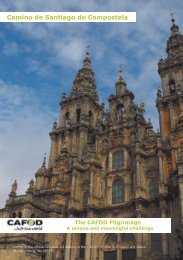Religious Education Curriculum Directory (3-19) - The Catholic ...
Religious Education Curriculum Directory (3-19) - The Catholic ...
Religious Education Curriculum Directory (3-19) - The Catholic ...
- No tags were found...
Create successful ePaper yourself
Turn your PDF publications into a flip-book with our unique Google optimized e-Paper software.
<strong>Catholic</strong> Bishops’ Conference of England and Wales — Department of <strong>Catholic</strong> <strong>Education</strong> and FormationB He shows us his love in creation. (54)a God created the world entirely out of love andnot out of necessity. (295)b God created human beings in his image andlikeness with the ability to give and receivelove. (1700-1706)C <strong>The</strong> suffering and Death of Jesus Christ shows andproves that love. (599-623)a God sent his Son to redeem everyone from sinso that all can share a life of love eternallywith him. (Jn 3:16-17; 599-605)b Jesus lives now and establishes a relationshipwith each and every one of us, particularlythrough the sacramental life of the Church.(662-664, 1084-1090)c God continually calls us to union with him inhis Son through the Holy Spirit by means of alife of holiness. (1091-1109)d God helps us know and sense his love throughthe people and events of our lives. (897-913,1069)D We also know of his love because he tells us of hisloving plan to save us.a He tells us in Scripture, the living Word of God.(80-82)b He also tells us through the liturgy of theChurch, speaking to us in the Scripture andgiving himself to us in the sacraments, especiallythe Eucharist. (1067, 1324-1327)c He tells us through the Church. (785-786)1.6.3. How can people say that God is good ifsuffering and evil are present in the world?A Suffering that exists in the world is not somethingcaused by God or sent by God; God only bringsabout what is good for he is goodness itself. Whenthere is evil and suffering, God does not cause it,but sometimes he does permit it for reasons wecannot now know or understand. (1500-1501)B Evil is a reality and a mystery. (309-314)C Some evil and suffering are a result of the work ofthe Devil or Satan. (395)D Some suffering is the result of human sin and isnot from God. It was God who gave us free will; sinis the result of the misuse of this gift. (1849, 1852-1853)E <strong>The</strong> Passion and Death of Jesus can help us to seebeyond suffering and remind us that God is presentwith us in our suffering, pain, and death; ourown personal suffering when united to Jesus’ sufferingbecomes redemptive for ourselves and others.(1851)F <strong>The</strong> Scriptures try to help us understand suffering:the psalms, the story of Job, and the prophetsoffer insights and consolation. In particular, theResurrection of Jesus can help us see beyond sufferingto hope and to eternal life. (638-655)G We need to remember that God always wantswhat is best for us. (374-379)H Natural disasters can be understood in part as aresult of Original Sin (400) and also because theworld is in a state of journeying toward ultimateperfection (310); they are not signs of God’s displeasureor punishment.1.6.4. How do we know that God wants us to behappy?A From the beginning of Creation, God has createdus to be happy both in this world and in the nextand has shown us the ways to be truly happy. Unhappinesswas caused by people themselves whenthey did not or would not listen to him. (374-379)B God sent his only Son, Jesus Christ, so that wemight be saved (Jn 3:16); this is a cause for happinessin spite of suffering. (599-605)C Jesus Christ taught us all he did so that we mightshare in his joy (Jn 15:11), which shows us againhis desire for our happiness. (736, 1832)D <strong>The</strong> manifesto for true discipleship and happinessis found in Christ’s teaching of the Beatitudes. (Mt5:2-10; 1716-1718)E True joy is the mark of followers of Christ. (Phil4:4; 1832)F Jesus established his Church to help people findtrue happiness and joy. (1832)1.6.5. <strong>The</strong>re are some who say that the beliefsand doctrines taught by the Church have beenmade up by members of the Church. How canwe be sure that what the <strong>Catholic</strong> Churchteaches has come from God?A We can be sure that what the Church teaches hascome from God because of Apostolic Tradition andApostolic Succession. (888-892, 861-862, 858-860)a What was revealed in and through JesusChrist was entrusted to St. Peter and the Apostles,who were taught directly by Jesus. <strong>The</strong>yin turn passed on those beliefs through thosewho succeeded them. (81, 84)b Through the centuries, the popes and bishops,21
















